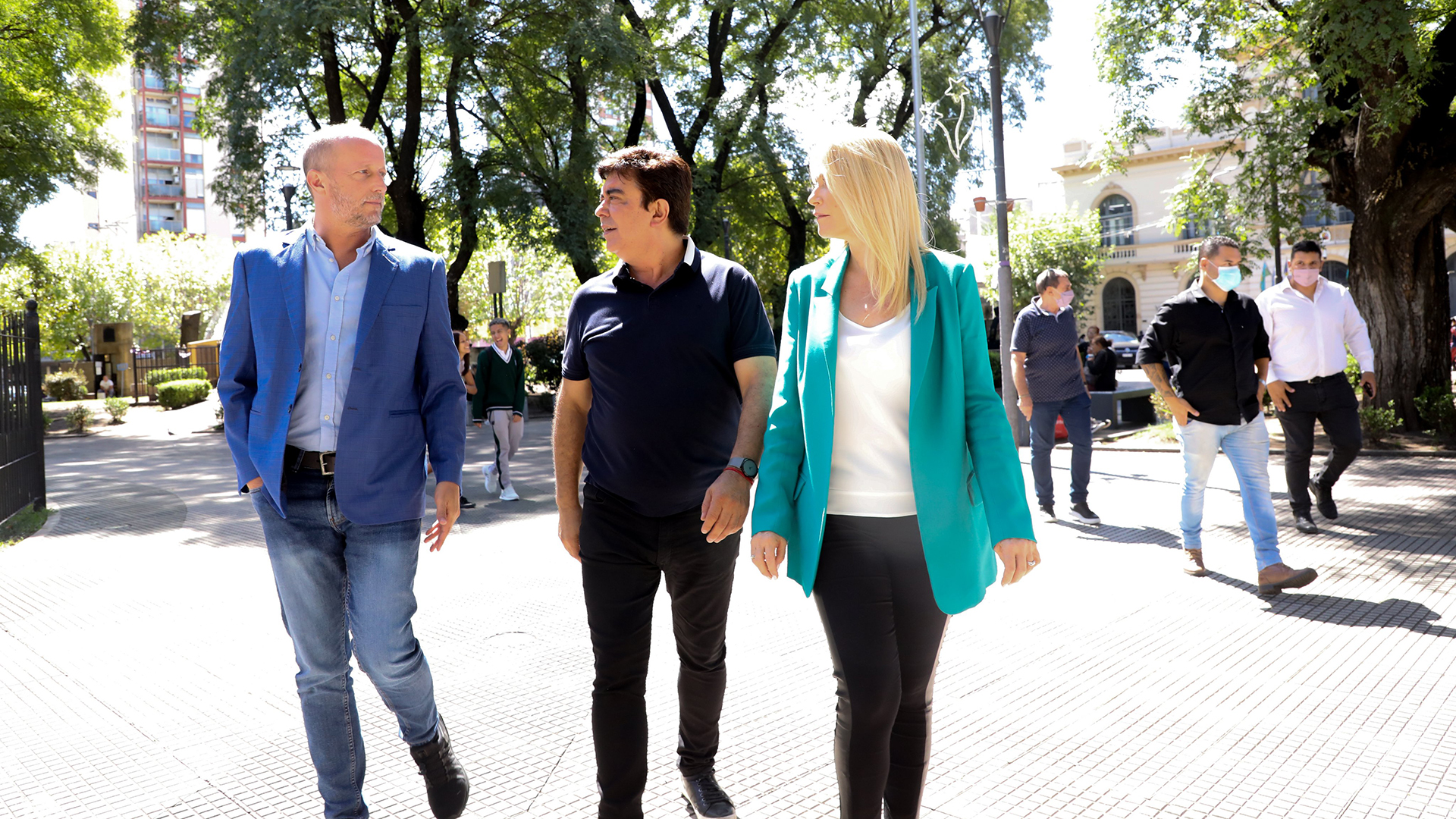Without much noise, the Buenos Aires mayors and mayors of the Justicialist Party (PJ) who make up the Front of All balance in the internal that shakes up the ruling alliance, which was unleashed since the resignation of the national deputy Máximo Kirchner from the presidency of the bloc in the House of Deputies of the Nation in rejection of the agreement that the national government signed with the International Monetary Fund (IMF) for the refinancing of the $44 billion debt taken in 2018 during Mauricio Macri's administration and which these days is being exposed with cross and public reproaches. At the general level, the communal chiefs try to sustain unity, although at the particular level the positions are not uniform.
Alberto Fernández knows that he has a group of territorial chiefs in the conurbano for himself, although those same mayors recognize that the main elector within the ruling party in their districts is still Vice President Cristina Kirchner. The President talks directly with some mayors. One of them is Mario Ishii from La Paz, who a few days ago, before the vote on the agreement with the Fund in the Chamber of Deputies, rushed national legislators. “You got on the list, now vote what the National Executive Power needs,” he said during a Women's Day event with the president. It was the same day that Fernández let it transpire that he could go for a re-election.
Alberto Descalzo, from Ituzaingó, is another of the mayors shown today near Fernández, as is Berazategui's Juan José Mussi. The president armed part of his Cabinet with communal chiefs of the suburban area to seek territoriality and speed in management. At the time, Fernández deposited a ceiling of political support in the mayors.

In the so-called albertism, the mayors who report at that table are two communal chiefs on leave: Gabriel Katopodis (San Martín) and Juan Zabaleta (Hurlingham). The former plays a central role in the internal containment of the Buenos Aires PJ and as a bridge with Kirchnerism. Katopodis played an important role in the search for accompaniments that Kirchner's arrival in the presidency of the PJ meant. The dialogue with today's incumbent party was fluid.
Zabaleta, meanwhile, is a hillside of the President. Last Saturday, while Máximo Kirchner was present at the Meeting of the Women's Branch of the Buenos Aires PJ, in San Vicente, Zabaleta was in a children's dining room in Punta Indio with Fernández, his partner Fabiola Yañez and the FdT national deputy, Victoria Tolosa Paz (who also said he was present at the Buenos Aires PJ activity) and Descalzo. A few days ago, in an interview with Infobae, Zabaleta said of the head of state: “He is a guy who has two problems and wants to solve them. And also, with his style, he intends to solve them within the framework of dialogue. Dialogue is not always about agreeing. Dialogue may be discussing and setting positions.”
The duo of Albertist ministers - both from the First Electoral Section - is joined by the head of the Ministry of Territorial Development and Habitat, Jorge Ferraresi, who is also the mayor in use of license of Avellaneda, a district that he does not neglect to the day and today under the leadership of Alejo Chornobroff. Last year, Ferraresi opened up the possibility of Fernández's re-election. The national deputy and former mayor of Florencio Varela, Julio Pereyra, is also close to Fernández. He even sits at the table with the Chief of Staff, Juan Manzur, as does the massacre Fernando Espinoza, who has a long-standing bond with the ministerial coordinator and uses him to reach Casa Rosada without intermediary. But Espinoza also appears in the Christinist spinel.

A key actor for the intendentism to maintain the debate and the differences in praxis inside is the Buenos Aires Chief of Staff, Martín Insaurralde. The mayor in use of leave of Lomas de Zamora maintains daily dialogue with Máximo Kirchner and was one of those who worked for his arrival as president of the Buenos Aires PJ.
Insaurralde expressed solidarity with Cristina Kirchner for the attack on her office during the vote on the agreement with the Fund in Congress. In addition, without too much swell, it adds its own support: mayors, provincial legislators and councilors turn to Insaurralde for different efforts. One example of this was the visit he made to the Expoagro exhibition last week. Mariano Cascallares (Admiral Brown), Gustavo Menéndez (Merlo), Walter Torchio (Carlos Casares), Hector Olivera (Tordillo), Carlos Tejedor's mayor María Gianini; the mayor of Colón, Ricardo Casi; the president of the Chamber of Deputies Federico Otermín from Buenos Aires and the president of the Consortium of the Port of San Nicolás and councillor for the FdT Cecilia Comerio, also a member of La Campora. There are more communal chiefs who follow the steps of Insaurralde such as Alejandro Acerbo (Daireaux) or Cristian Cardozo (La Costa), in addition to the provincial deputy Juan Pablo De Jesús.

Another community chief who seeks to sustain unity and is now a member of the Buenos Aires cabinet is Leonardo Nardini from Malvinas Argentinas. The current Minister of Infrastructure and Public Services of the province is also in charge of the Electoral Board of the Buenos Aires PJ. It is another one that pivots between the fronts of the All Front.
“The silence and parsimony of the government in the face of the attack on the office of the Vice President are stunned,” said the Secretary General of La Campora and Minister of Community Development of the province, Andrés “Cuervo” Larroque. What was written by the government official of Axel Kicillof on his social networks, was the externalization of a position that holds the wing closest to the vice-president within the FdT. That's what Máximo Kirchner thinks.
Kirchner's stance on voting against the Fund agreement, and even his resignation from the presidency of the ruling bloc, also has a little more explicit adherence within the universe of mayors. The mayor of Quilmes, Mayra Mendoza, is one of them despite the fact that her position and level of management lead her to maintain dialogue with all the mayors.
KEEP READING:
